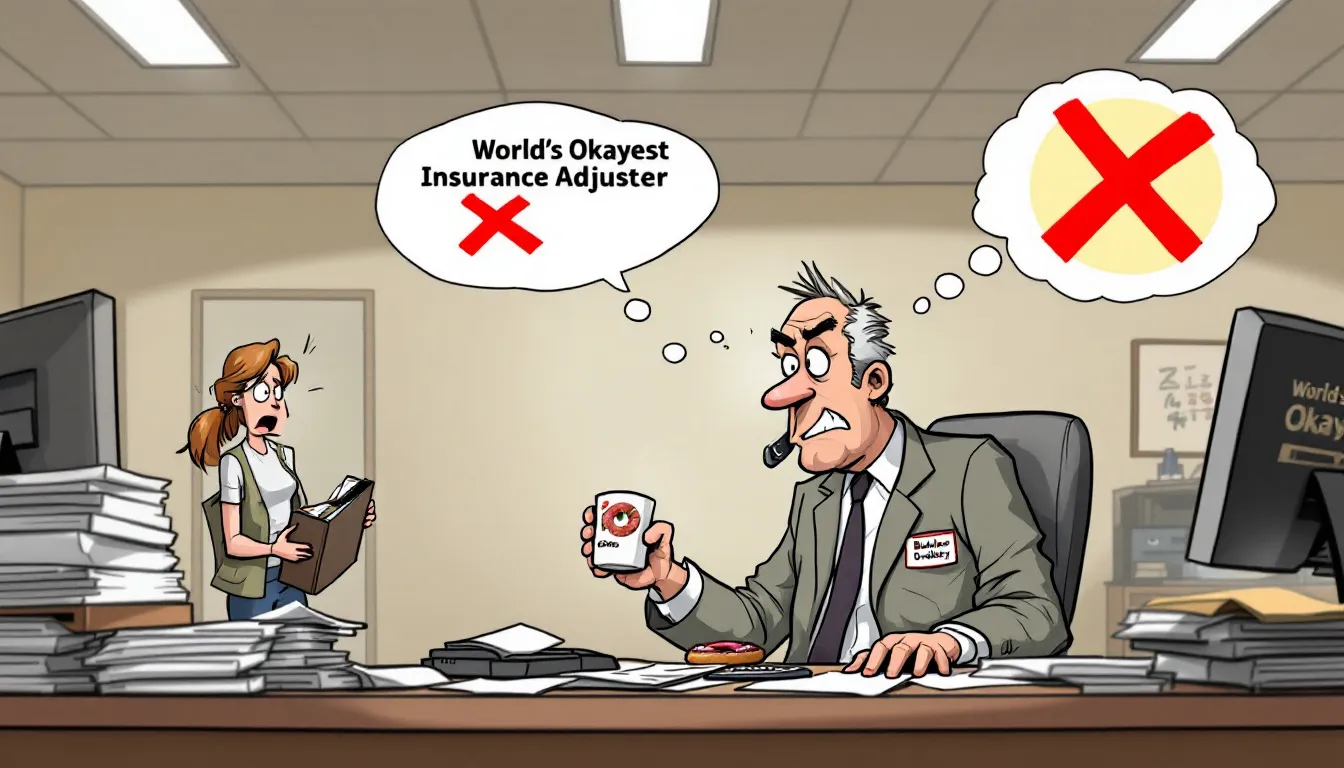Top Insurance Company Tricks to Watch Out For
Insurance companies sometimes use common tricks to minimize your payout. In this article, we’ll break down 7 common insurance company tricks and how to protect yourself, ensuring you get the compensation you deserve.
Key Takeaways
- Insurance companies often delay the claims process to push you towards accepting lower settlements. Stay vigilant and seek clarity on your claim.
- Be cautious of quick, low-ball settlement offers. Always consult a professional to understand the value of your claim before accepting anything.
- Don’t let insurers twist your words or discourage legal representation. Consulting an attorney can protect your rights and ensure you receive fair compensation.
Delaying the Claims Process

Insurance companies often engage in tactics that result in prolonged claims processes, utilizing various strategies designed to exhaust claimants and nudge them towards settling for a smaller amount.
When dealing with the repercussions of a motor vehicle incident, you might find these insurers not returning your calls or delaying responses to your inquiries, trapping you in an endless cycle of non-communication.
Insurance firms may deliberately distort the provisions within your insurance policy by incorrectly stating that certain medical treatments are not covered, creating confusion and stalling. They exacerbate this delay by repeatedly demanding unnecessary documentation.
The ultimate objective behind these maneuvers is to wear down claimants so they concede to accepting compensation that’s far less than what their claims are actually valued at. By deferring payments for medical expenses and other elements associated with your claim, they bet on your desperation for closure leading you to agree upon an undervalued settlement offer.
Offering Quick Low-Ball Settlements

Offering quick, low-ball settlements, also known as the ‘Swoop and Settle,’ is another one of the common insurance company tricks. This involves making rapid offers to settle claims before victims can consult with an attorney, exploiting your immediate financial pressures and lack of understanding about your claim’s true value. Offering quick, low-ball settlements is one of the common tricks insurance companies use to minimize their payouts.
Adjusters often push for quick settlements before you fully understand your injuries or the long-term implications of the accident. Overwhelmed and desperate for financial relief, you may find yourself accepting less money than your insurance adjuster claim is worth.
Premature settlements can have dire consequences. Accepting an offer usually means waiving your right to additional compensation for future medical needs, leaving you to cover those expenses if your injuries are more severe than initially thought.
Take your time, consult with a professional, and fully understand the value of your claim before accepting any settlement offer.
Twisting Your Words
Insurance companies are adept at manipulating your statements to limit their payout. Agreeing to give a recorded statement post-accident can be deceptive, as adjusters might cherry-pick your comments out of context, suggesting that you were at fault or trivializing the extent of your injuries. Twisting your words is one of the common tricks insurance companies use to limit their payout.
For example, declaring “I felt fine right after the collision” could later serve as grounds for insurance representatives to claim that any sustained injuries aren’t significant. Your words may be misinterpreted. It’s wise to refrain from giving a recorded statement and seek guidance from an attorney who specializes in car accidents first.
Insurers could belittle the severity of your wounds in attempts to lower compensation amounts by misrepresenting them as minor or pre-dating the incident. By sharing only pertinent medical records associated with your current case, you help shield yourself against such strategies. Seeking advice from an expert offers additional protection against these manipulative tactics.
Discouraging Legal Representation
Insurance companies, aware that a seasoned lawyer can significantly increase the chances of securing an equitable settlement, often attempt to dissuade claimants from obtaining legal counsel. They may suggest that engaging an attorney is excessive or financially burdensome by providing deceptive advice about your entitlements in order to discourage you from pursuing professional assistance. Discouraging legal representation is one of the common tricks insurance companies use to minimize their payouts.
These companies might contend that getting a lawyer involved will only make the process more complicated and isn’t worth the expense associated with it. Seeking guidance from an attorney before handing over any medical records guarantees that no superfluous details are revealed.
Having legal representation on your side can help avoid undue delays and contribute to achieving just settlements after car accidents. A knowledgeable car accident attorney has the skills necessary to recognize and challenge underhanded strategies used by insurance firms, ensuring you get appropriate recompense for your losses. It’s crucial not to agree to any settlement proposals until you have had a consultation with a qualified attorney.
Contact 1-800-THE-LAW2 today for a free consultation with a car accident attorney in our professional network.
Requesting Unrelated Medical Records
Obtaining medical records that are not directly related to a claim is a frequent strategy. Insurance companies search through your health history attempting to discover pretexts for reducing their payout on claims, by pointing out unrelated health issues that could undermine the strength of your case. Requesting unrelated medical records is one of the common tricks insurance companies use to reduce their payouts.
Take, for instance, an individual with prior instances of back discomfort who submits a claim for a recent accident-related back injury. The insurance firm may contend that the injuries resulted from an existing condition instead of the incident in question, which would decrease their responsibility and resultantly diminish the compensation they receive.
To protect yourself, it’s advised to restrict access to only those medical records pertinent to your present claim. Seeking legal counsel can ensure that merely relevant details are shared while preserving both your privacy and enhancing the legitimacy of your claim.
Blaming Victims for Their Injuries
Insurance companies frequently attempt to deflect responsibility for accidents and injuries by placing the onus on the individual involved in a car accident. By asserting that you, as someone seeking a claim, have played a role in either causing the accident or exacerbating your own injuries, they seek to minimize their financial obligation. Blaming victims for their injuries is one of the common tricks insurance companies use to minimize their payouts.
These firms might suggest that you share some blame for the incident despite clear fault lying with another motorist. They may also challenge how serious or legitimate your injuries are by suggesting they existed before the crash or aren’t quite as critical as you’ve stated. Such disputes can lead not only to delays but potentially smaller payouts from them.
To combat these strategies employed by insurance companies, it’s crucial to get medical attention promptly after an accident and meticulously document all related injuries. Maintaining comprehensive records of treatments received, relevant medical bills incurred, and any associated receipts is imperative. This will fortify your position against allegations from insurers trying to attribute fault onto you regarding those very same injuries.
Surveillance Tactics
Insurers may employ surveillance strategies to collect evidence that undermines your injury claims. These companies often engage private investigators who keep tabs on your daily movements, searching for actions inconsistent with the injuries you’ve reported. Surveillance tactics are one of the common tricks insurance companies use to undermine your injury claims.
Should you be recorded engaging in physical exertion or heavy lifting despite alleging a severe back injury, this visual proof could serve as leverage for insurance providers to diminish the severity of your condition and consequently reduce any potential compensation.
To safeguard against such intrusions and ensure the validity of your claim remains intact, it’s wise to limit social media activity following an accident. By doing so, you prevent posts or images from being taken out of context and used detrimentally by insurers aware that you’re under their watchful eye.
Denying Insurance Coverage or Downplaying Liability
Insurance companies often resort to denying insurance coverage or downplaying liability to avoid paying out claims. They might argue that the accident isn’t covered under the policy or that the car accident victim shares a significant portion of the blame. For instance, they could claim that the policyholder wasn’t operating the vehicle at the time of the accident, thereby denying coverage.
When discussing the accident with an insurance adjuster, it’s crucial to be cautious. Insurance companies may use various arguments to downplay liability, such as suggesting that the car accident victim was speeding or distracted at the time of the incident. Before speaking with an insurance adjuster, it’s wise to consult a car accident lawyer to ensure your rights are protected and to avoid inadvertently saying something that could be used against you.
Withholding Evidence and Critical Information
Another tactic insurance companies use is withholding evidence and critical information to deny or reduce claims. They might claim that the evidence is privileged or irrelevant to the case, making it difficult for you to prove your claim. This can be particularly frustrating when you’re trying to recover from a car accident and need fair compensation.
Hiring a lawyer can be instrumental in recovering withheld evidence and ensuring that the insurance company isn’t hiding anything. Insurance companies may use various tactics to withhold evidence, such as claiming it is confidential or unavailable. Being aware of these tactics and seeking legal help can ensure that you receive the compensation you deserve.
Building a False Sense of Trust
Insurance companies may try to build a false sense of trust with car accident victims to gain their confidence. They often use friendly and sympathetic language to make you feel comfortable and trusting. However, this is often a tactic to get you to let your guard down and reveal information that can be used against you.
It’s important to be cautious when dealing with insurance companies and not reveal too much information without consulting a lawyer. This tactic can be used to get you to accept a low settlement offer or to deny your claim altogether. Always remember that the insurance company’s primary goal is to minimize their payout, not to look out for your best interests. Consulting with a lawyer can help you navigate these interactions and ensure you receive fair compensation.
Summary
Navigating the insurance claims process can be a minefield, but being aware of these common tricks can help you protect yourself and ensure you receive the compensation you deserve. From delaying the claims process and offering lowball settlements to twisting your words and discouraging legal representation, insurance companies employ a variety of tactics to minimize their payouts. Being aware of these common tricks insurance companies use can help you protect yourself and ensure you receive the compensation you deserve.
Remember, you don’t have to face this battle alone. Consulting with an experienced attorney can help you navigate these challenges and secure a fair settlement. Stay informed, stay vigilant, and don’t let insurance companies take advantage of you.
Frequently Asked Questions
Insurance companies can delay the claims process by not returning calls, keeping you uninformed about your claim status, requesting excessive documentation, and misrepresenting insurance policy details.
Stay persistent and keep pushing for clarity to ensure your claim is processed effectively!
The ‘Swoop and Settle’ tactic is a strategy used to make fast offers to settle claims, often catching victims off guard before they have a chance to seek legal advice.
It’s crucial to be aware of this tactic so you can protect your rights and ensure you make informed decisions.
It is essential to steer clear of giving a recorded statement to an insurance adjuster as they may misconstrue or manipulate what you say, which could detrimentally affect your claim.
To safeguard your interests, exercise prudence and consider obtaining expert guidance before engaging in conversation with them.
Insurance companies discourage legal representation to minimize payouts and often mislead victims about their rights.
It’s crucial to advocate for yourself and seek the support you deserve!
To effectively protect your claim against insurance company tricks, consult an experienced attorney and carefully document all injuries.
Remember to limit the medical records you share and stay vigilant about potential surveillance.




